Research provided by Michael Hopkins, PhD.
You’ve likely already read about the recent Congressional Report on toxic heavy metals in baby food. Below, we will provide a summary of what’s happened and what the report found, followed by our own insights (and outrage!).
Timeline & Players
On August 1, 2019, the FDA received a secret slide presentation from Hain (which owns Earth’s Best Organic), revealing increased risks of toxic heavy metals in baby foods, which (according to the report), the Trump administration ignored. Hain revealed to the FDA that its “policy to test only its ingredients, and not its final product, underrepresented the levels of toxic heavy metals in its baby foods.” Hain had found arsenic levels as much as 93% higher in all finished foods they tested. Because Hain had only tested raw ingredients in order to estimate heavy metal levels, this means that every item they sell containing brown rice would contain significantly more arsenic than they’d estimated.
After seeing these results, the FDA took no action.
In November of 2019, following reports alleging high levels of heavy metals in baby foods, the Subcommittee on Economic and Consumer Policy (not the FDA) requested internal documents and test results from seven of the largest baby food manufacturers, which are:
- Nurture, Inc., which manufactures Happy Family Organics, including baby food products under the brand name HappyBABY.
- Beech-Nut Nutrition Company.
- Hain Celestial Group, Inc., which sells baby food products under the brand name Earth’s Best Organic.
- Gerber.
- Campbell Soup Company, which sells baby food products under the brand name Plum Organics.
- Walmart Inc., which sells baby food products through its private brand Parent’s Choice.
- Sprout Foods, Inc.
According to the report, of these seven manufacturers, the first four submitted all the requested info. The latter three refused to comply–which means that we have to call Parent’s Choice, Plum, and Sprout “Sneaky Stuff.” The report states that despite this refusal to cooperate, independent testing found “concerning levels of toxic heavy metals” in baby food from all three of these manufacturers.
(It’s worth noting that Campbell (Plum) claims that they thought they had been “full partners” in the study with congressional researchers. Walmart (Parent’s Choice) says they submitted the requested information in February of 2020 and never heard from the committee again. No response was mentioned from Sprout Organics in any news stories we’ve read–and makes no mention of it on their website or social pages.)
Best Stuff: Serenity Kids
This line of Paleo-inspired baby food uses organic vegetables and grass-fed and pasture- raised meats. Serenity Kids is verified by the Clean Label Project, which has a very thorough and transparent vetting process. They even publish a 165-page document detailing the exact methodology they use for testing and the thresholds used. Serenity’s products are tested for over 200 different contaminants including heavy metals, glyphosate, agrochemicals, plastics, and other toxins. Dr. Hopkins verified that Clean Label Project sends all samples off to third party lab sites for testing. Right now, this is probably the only brand we can confidently call Good Stuff. Use code GIMME15 for 15% off at Serenity Kids.
Major Findings & Recommendations
1. Arsenic, lead, and cadmium were present at problematic levels in all the brands that provided data.
Nurture (HappyBABY) was the only one of the manufacturers that even had testing data for mercury, and their test data shows finished food products with as much as 10 parts per billion (the recommendation is that it should not exceed 5 ppb). The FDA and EPA set a limit of 10 ppb for arsenic in drinking water, but even the cleanest of the tested brands (Gerber) had ingredients over 90 ppb; Nurture (HappyBABY) has sold baby food with over 180 ppb; Hain (Earth’s Best) sold products with up to 129 ppb. The report did not specify levels in finished products by Beech-Nut, but found that they used ingredients that tested at 913.4 ppb and “routinely used high-arsenic additives that tested over 300 ppb.”
2. Internal company standards allow for very high levels of toxic heavy metals and manufacturers have often sold foods that exceed even those levels.
Nurture (HappyBABY) has set an internal standard of 115 ppb of arsenic in infant rice cereal, which has been established by the FDA as a limit of 100 ppb. Beech-Nut had the highest internal standards for ingredients of any responding manufacturer, with some ingredient thresholds being set to 3,000 or even 5,000 ppb! Moreover, the current manufacturer practice of testing only ingredients (rather than finished product) clearly undercounts levels of toxic heavy metals present in the final products.
3. The subcommittee has “grave concerns” about Walmart (Parent’s Choice), Sprout Organic, and Campbell (Plum Organics) because they refused to cooperate with the investigation.
Walmart “refused to produce any documents showing its internal testing policies, its testing results, or how [it] treats ingredients and/or products that surpass any internal standards.” Instead of providing data, “Campbell [Plum] provided a spreadsheet self declaring that every one of its products ‘meets criteria.’ Campbell declined to state what those criteria are.” Independent testing shows high levels of heavy metals for Plum Organics Multigrain Little Teethers and Mighty Morning Breakfast Bars. Sprout “did not respond to the Subcommittee at all, despite numerous emails to executives and its general information email address, as well as numerous attempts to reach the Sprout central office by telephone.” Independent testing shows high levels of heavy metals for Sprout’s Organic Plant Power Apple/Kale Puffs.
4. The Trump administration ignored a secret industry presentation revealing the increased risk of heavy metal contamination in baby food, and has failed to effectively regulate despite forming an official task force in 2017, whose purpose was meant to address this very problem.
The FDA established the Toxic Elements Working Group in 2017, and it was charged with “reducing exposure to toxic elements in food, cosmetics, and dietary supplements.” The FDA claims that the Toxic Elements Working Group is focusing on metals “because high levels of exposure to those metals are likely to have the most significant impact on public health,” and “can be especially harmful to children because of concerns about effects on their neurological development.” But the working group has not resulted in new or stronger regulations to protect babies from toxic heavy metals in their food. Moreover, the insufficient and very limited regulation that does exist is in some cases unenforceable and grossly inconsistent. What follows are examples of specific data on the consumable items on which the FDA has managed to provide regulations, in order to highlight how limited and inconsistent it has been:
- Lead: “FDA has released guidance recommending a maximum lead level of 100 ppb in candy likely to be consumed by children, and 50 ppb in some juices. It is not sound logic to say that water is unsafe to drink if it contains over 5 ppb lead, but candy and fruit juice can be ten and twenty times higher than that limit. Unfortunately, it appears that FDA designed these limits to be protective of industry.”
- Mercury: “FDA has only set mercury standards for wheat, and fish, shellfish, and crustaceans, and they are high—1,000 ppb. There are no FDA protections for mercury in baby food.”
- Cadmium: “FDA has taken no action on cadmium in baby food. FDA has issued only one guideline for cadmium, and that is a limit of 5 ppb for bottled water. [In contrast], The EU has instituted a limit of 10-15 ppb for infant formula.”
- Arsenic: The FDA, EPA, European Union, and WHO have all set inorganic arsenic limits to 10 ppb for drinking water. However, “…there are only two FDA regulations for specific products—an unenforceable draft guidance issued in July 2013, but never finalized, recommending an action level of 10 ppb for inorganic arsenic in single-strength (ready to drink) apple juice, and an August 2020 final guidance, setting an action level for inorganic arsenic in infant rice cereals at 100 ppb.” Apparently the level of arsenic allowed in infant cereal is 10 times higher than drinking water because this number (100 ppb) is based on cancer risk, rather than neurotoxicity or other health risks. “There can be only one safe level for inorganic arsenic in the foods that babies consume. All finished baby food products should accord with this safe level. Aside from these guidance documents for infant rice cereal and apple juice, the FDA does not regulate toxic heavy metals in other baby food products.”
5. The report concludes with the following actionable recommendations. (This is lifted verbatim from the Executive Summary):
- Mandatory testing—Baby food manufacturers should be required by FDA to test their finished products for toxic heavy metals, not just their ingredients.
- Labeling—Manufacturers should by required by FDA to report levels of toxic heavy metals on food labels;
- Voluntary phase-out of toxic ingredients— Manufacturers should voluntarily find substitutes for ingredients that are high in toxic heavy metals, or phase out products that have high amounts of ingredients that frequently test high in toxic heavy metals, such as rice;
- FDA standards—FDA should set maximum levels of toxic heavy metals permitted in baby foods. One level for each metal should apply across all baby foods. And the level should be set to protect babies against the neurological effects of toxic heavy metals
- Parental vigilance—Parents should avoid baby foods that contain ingredients testing high in toxic heavy metals, such as rice products. Instituting recommendations one through four will give parents the information they need to make informed decisions.
Gimme the Good Stuff’s Take on the Report
Hopefully, Dr. Hopkins’ summary above helps you understand exactly what’s happened. What follows are his and my major insights and suggestions on what to do:
1. No evidence suggests that these four “bad” companies (Gerber, Earth’s Best, HappyBABY, and Beech-Nut) are exceptional in any way when it comes to heavy metal contamination. Rather, they are examples of a much larger problem that applies to all baby food.
Some news articles gave the impression that these four companies are somehow uniquely reckless (CNN wrote that “four leading baby food manufacturers knowingly sold baby food that contained high levels of toxic heavy metals,” for instance.) Remember that the congressional committee only asked seven companies for data and the four who submitted data were actually the ones being compliant, whereas the other three were flat out uncooperative–and then of course you still have the dozens of other baby food manufacturers who were never asked to submit data at all.
2. Trying to rank these companies into Good, Bad, and Sneaky Stuff based on this report is like comparing apple (juice) to oranges.
Several different metrics are used to report levels of heavy metals across all these brands and from one product type to another, making it virtually impossible to compare them directly. For example Nurture (HappyBABY) is the only baby food manufacturer that appears to regularly test its finished baby food products, whereas the others only test ingredients. And as the 2019 secret report from Hain showed us, you cannot accurately predict heavy metal levels in the final product based on ingredient calculations.
3. Although we can’t give a definitive ranking of which companies are Good, Bad, or Sneaky, below are the notable headlines for each of these companies, (according to the report), which you can use to draw some value comparisons between brands:
- Nurture (HappyBABY) gets a particularly pointed critique in the report, despite being the only company that routinely tests the final product (as opposed to just testing ingredients), because they said outright in their letter to the subcommittee that “our heavy metal testing is performed as part of our monitoring program and not as a condition of product release, all of the products that were tested were sold into commerce.” In other words, they stated plainly that they will sell everything regardless of heavy metal content. Furthermore, Nurture gets called out for basically lying to the committee about it’s testing, claiming that they used a goal standard of 50 ppb lead after January 2019, and then later submitting test documents showing a goal standard of 100 ppb.
- Beech-Nut set internal arsenic and cadmium standards at 3,000 ppb in dangerous additives, such as their vitamin mix, and 5,000 ppb lead for certain ingredients like BAN 800. These standards are the highest of any responding manufacturer. The report points out that although Beech-Nut stated in their letter that they “rarely” accepted ingredients that failed to see their internal standards, the data they submitted contradicts that with several examples of accepted and sold ingredients that far surpassed standards (cadmium levels in their dehydrated sweet potato, for example).
- Hain (Earth’s Best Organics) appears to deserve some credit for being the whistleblower, even though they themselves are guilty of selling baby food with dangerous levels of heavy metals. They were the ones to point out that the current manufacturer practice of testing only ingredients (rather than finished product) clearly under-counts levels of toxic heavy metals present in the final products. Like all manufacturers, Hain was called out in the report for setting its own dangerously high internal standards, and then routinely accepting ingredients that surpassed these standards, as well as continuing to do so AFTER giving their secret presentation to the FDA about these risks.
- Of the four companies who released data for the report, Gerber (surprisingly) comes off as the least guilty of gross negligence. For each of the specific heavy metals listed, the examples of Gerber ingredients’ metal levels appear relatively low compared to the other manufacturers, and they are the only company that does not get specifically called-out for some particular example of gross recklessness. That said, the report does list many examples of ingredients with high heavy metal concentrations; for example, Gerber used 67 batches of rice flour with over 90 ppb of inorganic arsenic.
- Don’t forget that Campbell Soup Company (Plum Organics), Walmart Inc. (Parent’s Choice), and Sprout Foods, Inc. (Sprout Organic Foods) did not comply with the request for data, so I am deeming them ALL Sneaky Stuff.
Better Stuff: White Leaf Provisions
We offer White Leaf Provisions biodynamic baby food in our online store, and their owner says: “I want to reassure you that we test annually for metals in all four baby food blends and I am happy to say that our results come in below the FDA limit that they set for rice cereal and apple juice.”
4. Nothing about these alarming levels of toxic heavy metals is unique to baby foods.
The reason baby food is important in this discussion is because of the significantly increased health risks that babies face from heavy metals, due to their developmental stage and small bodies. Giving your baby adult foods does not solve this issue, unfortunately. There are, however, many things you CAN do to try to limit your baby’s exposure to heavy metals, while we wait for FDA regulation to catch up with current scientific data/standards. This article provides great details on how to avoid these ingredients.
5. In general, these contaminants come from the raw ingredients, not the manufacturing process.
Unfortunately, heavy metals can occur naturally in certain raw ingredients, and in the environment. It’s worth noting that this is a much bigger problem now than it was before the 1940s when we began a decades-long assault on our soil, covering arable land with heavy-metal rich fertilizer and pesticides. It’s really a challenge to take them out in some cases, and that’s part of the FDA’s defense as to why there aren’t stricter guidelines. However it doesn’t change the main point about creating laws and policies that prevent these raw ingredients from being used in baby food in the first place (rather than just searching for ways to reduce the heavy metals in the ingredients) and secondly, give the consumer enough information to make an informed choice.
6. But…”naturally occurring” heavy metals may not be the only source of unsafe levels of these toxins, and we should be aware of certain problem ingredients.
The report identifies a handful of specific ingredients that had extremely high levels of certain heavy metals, and even though these ingredients might make up a very small percentage of the final product, it appears they may be driving the overall numbers up much more than pre-production calculations would predict. The specific problematic ingredients that were highlighted in the current report include: cinnamon, amylase, BAN 800, and vitamin/mineral premix. When Dr. Hopkins first presented me with this information, I thought, how is this any different from the arsenic in rice and foods? The difference is that rice is a whole food that might make up 50% or more of a final product and also tends to have high levels of arsenic—perhaps even exceeding 100 ppb. On the other hand, the specific problematic ingredients would typically only comprise a very small amount of finished product (1-2% or less), however the report shows that the levels of heavy metals in these ingredients is orders of magnitude (100’s to 1000’s ppb) higher than what you would find in rice or a sweet potato, for example. So while the report suggests that we should reconsider whether to include rice in baby foods, the authors are also pointing out that a separate but related task is to identify trace ingredients such as those listed above and remove them entirely from the baby food supply chain.
7. More than anything else, this report emphasizes the lack of effective regulation by the FDA, and is a major call to action.
If you take only one thing away from this post, let it be this: the data from this report highlights an inexcusable lack of action from the FDA (specifically, following the formation of a special task force in 2017 to address this issue, and in response to Hain’s whistleblower presentation in 2019) and an urgent need to address this public health concern. As you read above, the report goes through each of the heavy metals and points out how limited and random the guidelines are. The clearest example of the inconsistency from the FDA is that drinking water has a maximum of 1-10 ppb for all of these toxic heavy metals, but then only a handful of specific foods have set limits and generally they are much much higher. Or we could use arsenic as another example. The maximum allowable limit or inorganic arsenic in drinking water is 10ppb. Only two other items have arsenic limits- infant rice cereal and apple juice. In other words, the only category of “baby food” that has an arsenic limit is infant rice cereal–and the limit is 100 ppm. Apparently, this limit is based on the risk of causing cancer, rather than neurotoxicity or any other adverse health outcomes. If we look at the only other item with a specific limit, we see that apple juice is capped at 10 ppb. This is a great start for apple juice but does nothing at all to address levels of arsenic in other juices, or anything else at all for that matter. And yes, arsenic IS present in other juices. For example, Gerber’s data shows a grape juice concentrate with 39 ppb inorganic arsenic, but there are no FDA guidelines at all regarding arsenic in grape juice or any other juice besides apple.
Nine Steps You Can Take to Reduce Your Family’s Risk
- Know your farmer. While all of our air and soil is contaminated by some amount of heavy metal, growing your own produce or buying from an organic farm you trust may reduce the amount you’re consuming. Dr. Hopkins agrees that “it makes sense that soil that was never commercially farmed should be less contaminated with heavy metals.”
- Reduce your consumption of the dirtiest foods. Unfortunately, many otherwise healthful foods are some of the most contaminated with heavy metals. Farmed fish is a major offender, and large fish like tuna and swordfish are very high in mercury. (Better fish options include trout, sockeye salmon, and sole.) Brown rice contains up to 80% more arsenic than white rice, so when you do eat rice, you should consider choosing white. Sadly, leafy green vegetables are often contaminated with cadmium. Other high-risk vegetables include potatoes, carrots, radishes, onions, lettuce, mint, and cilantro.

Unfortunately, leafy greens contain cadmium.
- Choose the right rice–and cook it like pasta. White basmati rice from California, India, or Pakistan has been shown to have the lowest levels of arsenic. If you cook rice the same way that you cook pasta–in a large amount of water and then draining it–you can get rid of more than half the arsenic it contains.
- Minimize snacks foods for your baby. Snack foods were particularly bad in this report–including crackers, puffs, and teething biscuits. To the degree that you can avoid these (and I know this is hard!), you should. Here are some healthier snack ideas.
- Eat a variety of foods. A diverse diet is beneficial for many reasons, and feeding your kids a range of whole foods will ensure that they aren’t getting too much of any one ingredient (and its potential contaminants). Meat and dairy–while not without their own issues–are less likely to be contaminated with heavy metals. And some fruits and vegetables–zucchini, broccoli, artichokes, tomatoes, peppers, beans, cauliflower, apples, avocados, bananas, grapes, peaches, and strawberries–are lower in heavy metals.
- Make your own baby food. As mentioned above, this won’t eliminate heavy metals in your baby’s diet, because plenty of whole foods naturally contain high levels of heavy metals. I would skip rice cereal all together, though, and here are our resident health coach’s suggestions for rice cereal alternatives.

Oatmeal is a healthier alternative to rice cereal.
- Skip juice entirely. Apple and grape juice are among the worst foods when it comes to arsenic. There’s no reason toddlers need juice at all–so this is just a good reminder to stick to water as much as possible.
- Peel produce. If you peel a sweet potato, you’ll reduce the heavy metals significantly, especially if you peel a little deeper than you might normally.

Peeling sweet potatoes will reduce the amount of arsenic they contain.
- Filter your water. Installing a robust water filter is one of the simplest ways to reduce your family’s exposure to heavy metals. Here’s how to choose the right filter.
The bottom line is that while there are steps we can take as consumers (and manufacturers), the most important action going forward must come from the FDA. Consider signing this this petition or contact your local and state representatives to demand action at the government level.
In the meanwhile…
Stay sane,


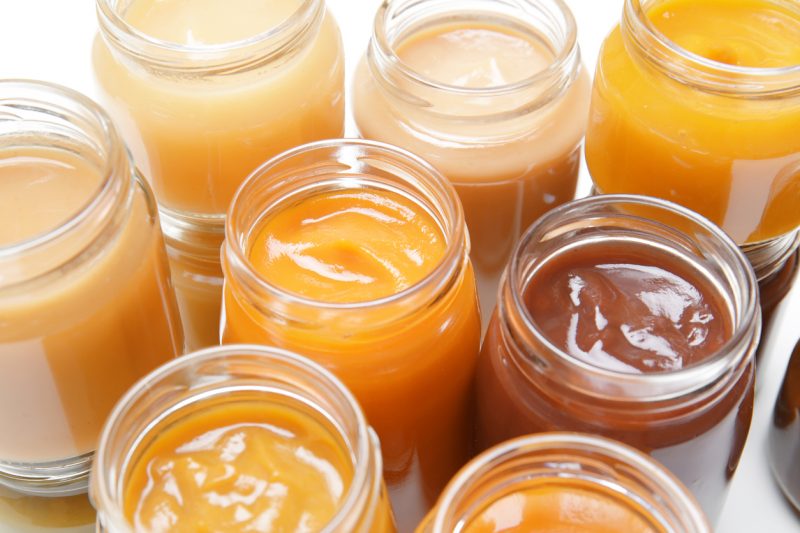
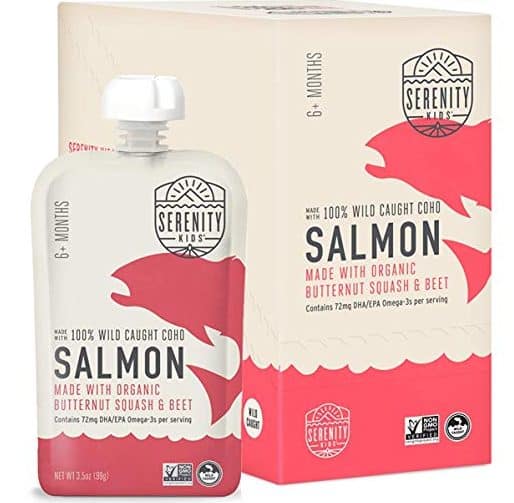
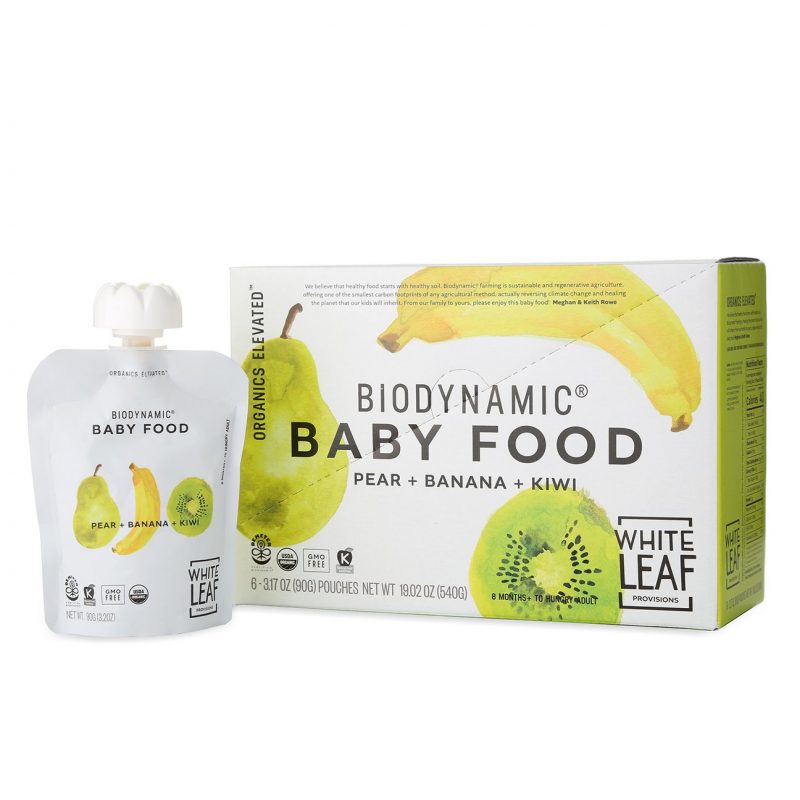
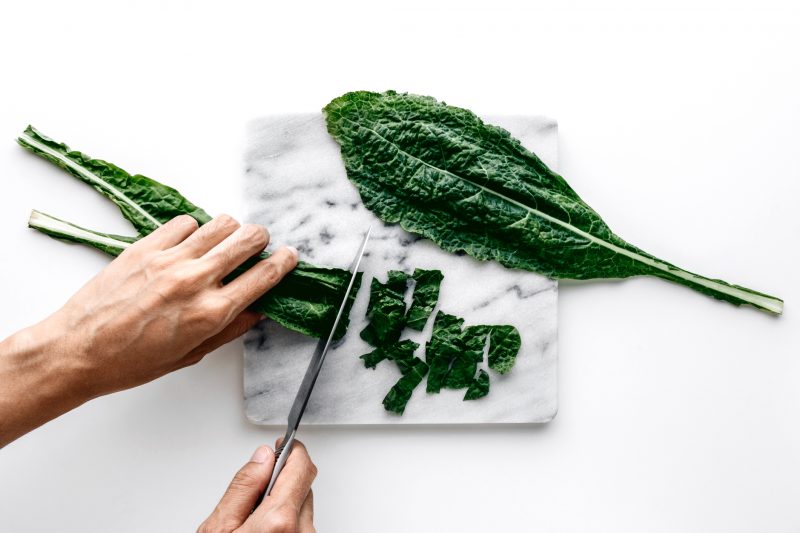
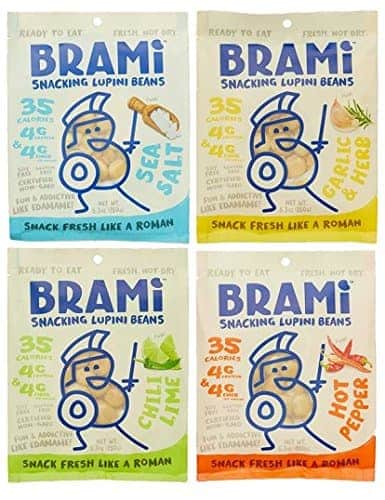
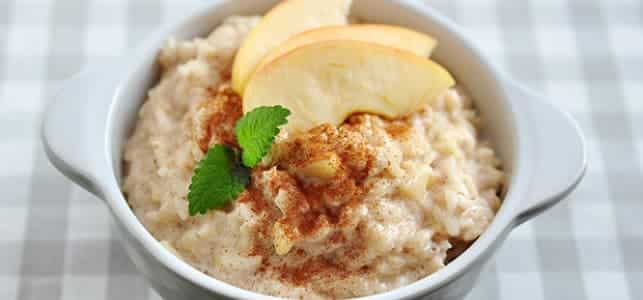



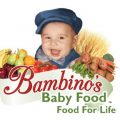
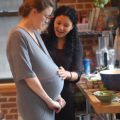
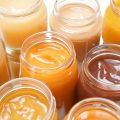

Jolynn says
Hi there, I went off of your baby food guide and bought the sprout brand to feed my daughter thinking it was safe because it was under “good stuff”. I’ve been feeding it to my daughter and now there’s heavy metals in it! should I be worried?? I’m freaking out.
Maia says
This problem is not unique to baby food, unfortunately. If you read the article above you will see that it’s more about avoiding certain ingredients than avoiding brands.
Jolynn says
Okay I don’t think I’m understanding the article I did read it. So if I stay away from baby foods fruit juice concentrate, rice based, cinnamon, amylase, BAN 800, and vitamin/mineral premix. The baby food should be okay. What about fruit purée blueberry was tested and seemed to have high levels as well, I’m confused. Sorry I’m a sleep deprived mom of 4.
Andrea Cox says
You specifically mention vitamin mix as being a culprit. We use sprout brand baby food. I cannot find where vitamin mix is listed on any of the varieties that we buy. Would it be listed under any other name? Thank you.
Karen says
I suspect a lot of parents will freak out after reading this article. I appreciate your list of suggestions to reduce the risks, and the emphasis you place on the need for better regulation. But can you offer any insight into what this information means for parents who’ve already fed their children the nasty products? Yes, we should limit certain ingredients in the future, but are our children doomed? Have we done irreparable damage? Is my daughter throwing a tantrum because she’s consumed too much arsenic in her (organic!) brown rice or because she’s a normal four-year-old? Thanks!
Rachelle says
Hello Maia, could you please review Little Spoon and Hello Yumi baby food brands? They are subscription services online that I chose after doing my own research on this issue last year. I’d love to hear your thoughts on those, thank you.
Victoria Conrad says
Yes!! I use Yumi and they’re fresh organic baby food but I’m wondering if it makes a difference? Curious where they get their food from (soil wise) and of theirs tested any lower…or if they even test!
Melissa says
May be time to take down your old articles recommending happy baby as good stuff.
Maia James says
yes, all of the guides on baby food will be updated.
Marisol says
Any information on the Baby Gourmet brand? It is a Canadian brand, but all of the pouches say that it is made in the US.
Maia James says
I’m sorry, we don’t know that brand.
Marisol says
Also, does this apply to European brands such as Loulouka and Holle?
Maia James says
Europe has actual standards for metals in baby foods, unlike America.